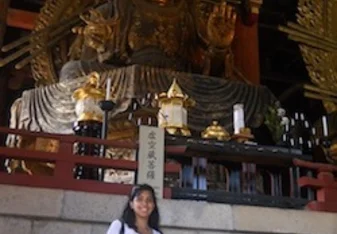Why did you decide to study abroad with CET?
Ishani: When I first started looking for a program in Japan, I had one condition: I couldn't go on a fall program that ran over into Scripps's spring term, and I couldn't do a spring program that extended past my sister's mid-June graduation date. My study abroad director actually recommended I apply to CET based on how closely their schedule aligns with our semesters! Once I looked into the program, however, I found I really liked the idea of living with Japanese roommates. I didn't think I could ever be fully at ease as a guest in someone's home, and I definitely didn't want to get stuck in a dorm where the only people around were other English-speaking students! On top of that, I'd heard great things about Osaka from other travelers, and the language coursework emphasized by CET looked intensive enough to get even a low-level speaker like myself up to speed.
Tell us about an experience you had that you could not have had at home.
Ishani: Two festivals, the Jidai Matsuri in Kyoto and the Hi no Matsuri in nearby Kurama, happen annually on the same day - and I was determined to experience both! In the morning, I took the train to Kyoto, where literally thousands of people in historical costumes emerged from the imperial palace grounds and paraded through the city despite blazing sunshine. The parade lasts about four hours, with people from every social class and era making an appearance, and I watched about half before heading into the mountains for tiny Kurama. On this day, crowds began to gather along the town's only road before dusk. After dark, residents lit the watch fires in front of their homes, and men began to carry massive, burning, pine torches through the street, shouting as they went. It was an long, exhausting day from start to finish, but one I could never imagine experiencing anywhere else.
What was the best place you visited outside of your study abroad city?
Ishani: Tough choice! Kyoto probably has the most places to see, though Nara and Kobe are not to be missed either. Ginkakuji, Kiyomizu-dera, and the Imperial Palace are all great for seeing different styles of Japanese architecture, especially in the fall when the leaves are changing, and I would suggest Iwatayama Monkey Park to any animal lovers. However, my personal favorite spot was a bridge near Demachiyanagi Station, in the northern part of the city. I walked this bridge several times, and each time I saw something different: cranes wading through the river, families strolling along the banks, and once a distant rainbow. There are even carved turtles - my favorite animal - placed next to the stepping stones across the water. Crossing that bridge always felt refreshing after the bustle of the city proper, and it remains one of my favorite places in all of Japan despite not being a tourist attraction.
What is one piece of advice you'd give future CET Japan students?
Ishani: Probably the best piece of advice I can give is this: know your expectations! Have an idea of what things you want to see or do, and be aware that this is not a program for people who just want to sightsee. You will have a solid amount of homework, and as you begin finishing your final interview project, you're going to be very busy! So if you want to do a lot of clubbing, or traveling, just keep in mind that your time, like your money, should be budgeted. Also know what household problems you're willing to let slide and which ones you can't deal with. Your housemates will have a different set of expectations with regards to your shared space, and what seems obvious to you won't always be obvious for them - and vice versa! Basically, if you come into the program able to express what you want from the beginning, you?re a lot less likely to have problems - academic or social - later on.

